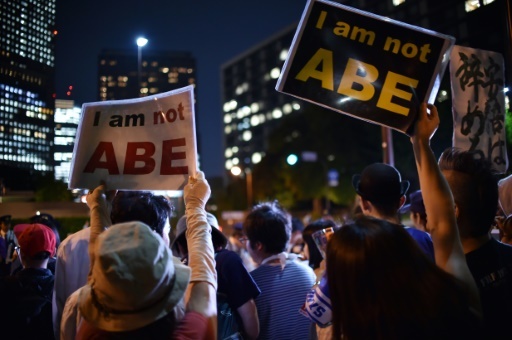Japan moves closer to passing controversial security bills amid scuffles in
Japanese politicians have scuffled in the upper house as they tried – and failed – to stop a security bill that could see the military fight overseas for the first time since World War II.
Upper House committee chairman Yoshitada Konoike was surrounded by lawmakers as he forced a vote on the legislation.
The proposed legislation sailed through the lower house – where Abe’s coalition commands a two-thirds majority – in July.
The bills are designed to expand the scope of the Self-Defense Forces’ operations overseas in a bid to tighten Japan’s alliance with the United States.
Protesters filled the street outside a hotel near Tokyo, where the committee held a public hearing on the legislation earlier Wednesday.
Lawyer Takahisa Mizukami called for the bills to be scrapped, saying, “The Constitution will lose its significance if (the government) does as it pleases to change the interpretation and say it is constitutional”.
While middle-age citizens and aging leftists formed the core of the anti-nuclear protests, young people provided the spark for mass protests this summer, said David Slater, a professor of cultural anthropology and director of Sophia University’s Institute of Comparative Culture, in Tokyo.
As the drama was playing out in parliament, a few hundred protesters continued to rally outside the building under a steady rain, after a bigger demonstration by thousands the previous night. “We are relieved. Now we will do our utmost for approval of the bills in a house vote”.
The main opposition Democratic Party of Japan remains opposed to the bills, which have met with vocal criticism from well-known authors, musicians and filmmakers, as well as some within Abe’sown party.
They are the latest in a series of moves by Prime Minister Shinzo Abe to renegotiate Japan’s place on the world stage, particularly in light of perceived territorial encroachment in the region from Japan’s old rival China.
In an effort to assuage concern that the ruling coalition is “railroading” the bills through parliament, Abe signed an agreement with three minor opposition parties Wednesday.
“Although it was unfortunate that the bills had to be approved this way, they are absolutely needed in order to protect the lives and happiness of the people”, Masahisa Sato, a member of the committee for the ruling Liberal Democratic Party, told public broadcaster NHK shortly after the vote.
The right can be exercised under three conditions – if a friendly nation is under attack which results in a threat to Japan’s survival, if there are no other appropriate means to repel the attack, and if the use of force is limited to the minimum extent necessary.
The heated political battle between the ruling and opposition parties over the timing of the passage of the security-related bills has reached its climax.
Mr Abe, whose public support has taken a hit over the legislative push, has vowed to enact the laws by the end of the parliamentary session on Sept 27.
Abe says Japan needs to pass the bills to ensure regional peace and security in the face of rising Chinese assertiveness, and to participate more widely in global peacekeeping missions.
Although the current post-war constitution, which bars troops from taking part in combat except in pure self-defence, was imposed by U.S. occupiers, many Japanese feel strongly any change would alter the country’s pacifist character.








